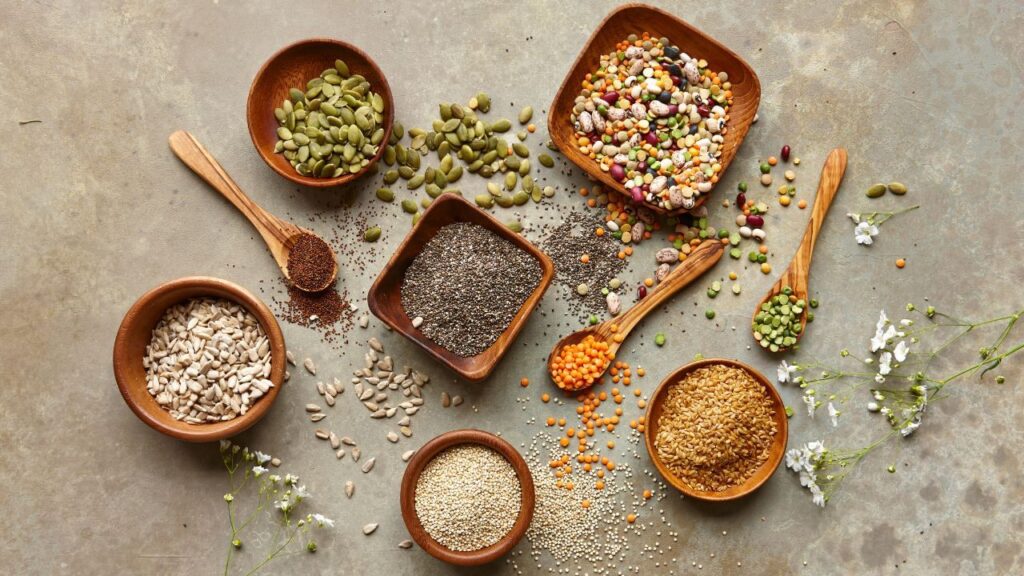Maintaining good health and vitality is essential, and a balanced, nutritious diet plays a vital role in achieving this. It is highly recommended to focus on healthy, homemade meals that are low in spices. Additionally, incorporating nuts and seeds into your diet can yield numerous health benefits. These seeds are packed with a variety of nutrients that contribute to overall wellness. You can consume these seeds raw, soaked, or as an addition to soups, salads, or smoothies for added flavor and nutrition.
Dr. Palak recently shared a post on Instagram detailing six types of seeds, their nutritional benefits, and how they can enhance our health. Let’s explore these beneficial seeds in more detail.
Sunflower Seeds
Sunflower seeds, also known as mustard seeds, are rich in Vitamin E and selenium. These seeds act as antioxidants, protecting cells and supporting the immune system as well as promoting healthy skin. Including sunflower seeds in your diet can easily elevate your nutrient intake while adding a delightful crunch to your meals.
Chia and Flax Seeds
Chia seeds are famed for their weight loss benefits and are also known as flaxseeds. Both chia and flax seeds are excellent sources of omega-3 fatty acids, which are vital for heart health. Moreover, they help reduce inflammation and offer cognitive benefits, making them a great addition to your daily meals. You can mix them into yogurts, smoothies, or oatmeal for a health boost.
Pumpkin Seeds
Pumpkin seeds, or pepitas, are a significant source of zinc and manganese. These nutrients are essential for immune function, skin health, bone strength, and metabolism regulation. Incorporating pumpkin seeds into your diet can help you achieve better overall health and well-being. They make a great snack or can be added to salads and baked goods for added nutrition.
Black Sesame Seeds
Black sesame seeds, often referred to as black cumin seeds, are beneficial for enhancing iron absorption. They play a crucial role in the formation of red blood cells and provide support for bone and blood vessel health. Additionally, their antioxidant properties contribute positively to overall health. You can sprinkle these seeds on various dishes for a delightful nutty flavor.
Hemp Seeds
Hemp seeds, known for their rich nutrient profile, are loaded with manganese, linoleic acid, and magnesium. These seeds are recognized for their potential benefits in maintaining bone health and improving skin conditions. Adding hemp seeds to your meals can provide a nutty texture while also boosting your intake of essential fatty acids and proteins.
Benefits of Regular Seed Consumption
Regular consumption of these seeds can supply your body with essential nutrients, contributing to your overall health and boosting your energy levels. They are versatile and can be easily added to salads, smoothies, and many other dishes. However, it is crucial to consult with a healthcare professional before incorporating any new seeds into your diet, especially if you have conditions like high blood pressure, diabetes, or any other health issues. An expert can provide advice tailored to your specific health needs, ensuring you reap the most benefits from these nutritious seeds.
Table of Nutritional Benefits
| Seed Type | Main Nutrients | Health Benefits |
|---|---|---|
| Sunflower Seeds | Vitamin E, Selenium | Antioxidant properties, supports immune system, and skin health |
| Chia & Flax Seeds | Omega-3 Fatty Acids | Heart health, reduces inflammation, cognitive benefits |
| Pumpkin Seeds | Zinc, Manganese | Immune function, skin health, bone strength |
| Black Sesame Seeds | Iron | Red blood cell formation, improved bone and vascular health |
| Hemp Seeds | Manganese, Magnesium | Bone health, skin conditions |
Incorporating these six types of seeds into your daily diet can significantly enhance your nutritional intake and promote overall wellness. Embrace the power of nature with wholesome seeds for a healthier lifestyle!

